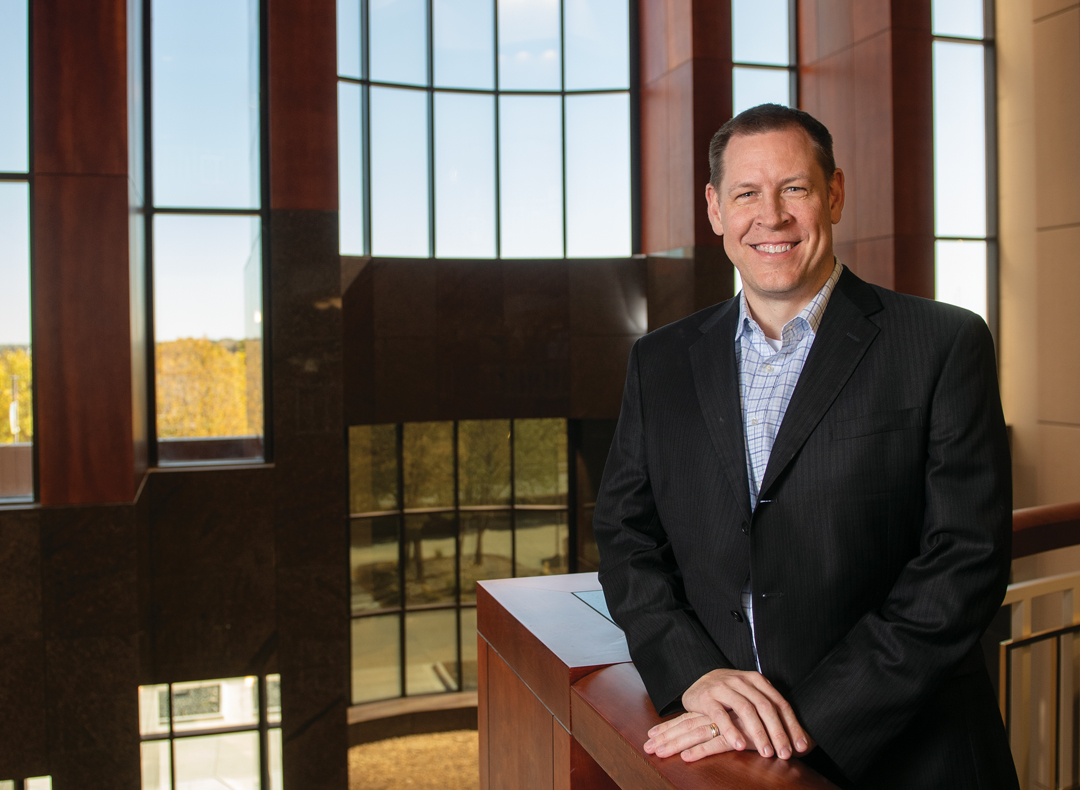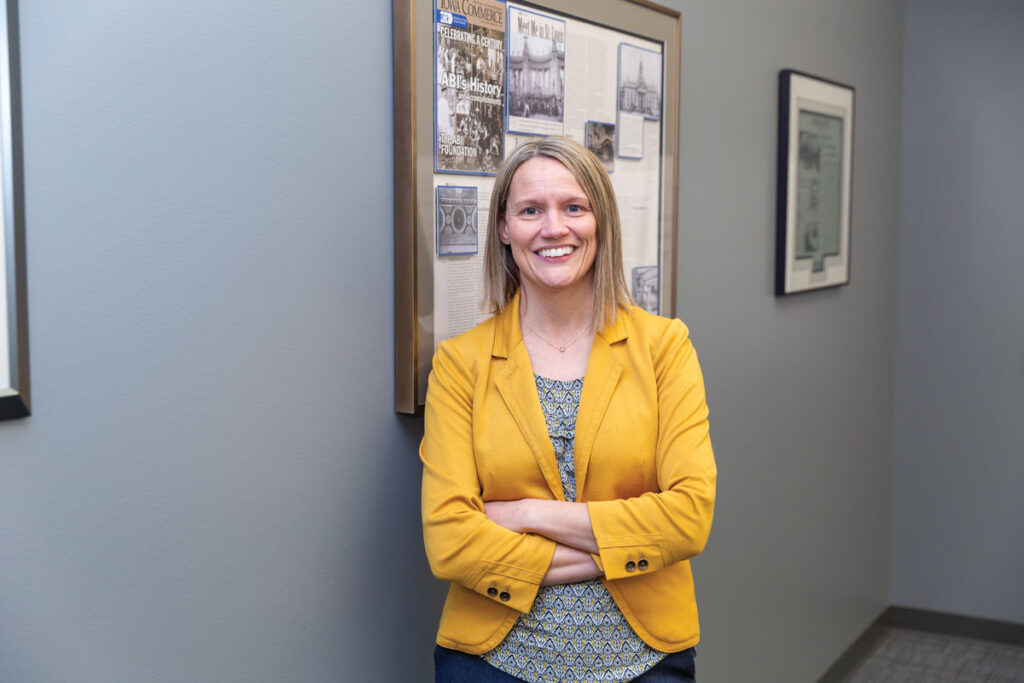A Closer Look: Joshua Rehmann
Chief medical officer, UnityPoint Clinic

Joshua Rehmann’s first exposure to health care was as a kid growing up on a farm in rural Minnesota.
From as early as he can remember until he left for college, Rehmann helped his dad immunize and administer medications to the animals raised on the farm, including pigs, feeder cattle and chickens.
“I always had either human medicine or veterinary medicine in the back of my mind when I went to college, and then once I started going through undergrad and did a little bit of research after, human medicine won out,” Rehmann said. “It’s been more the anatomy and physiology side of it that always fascinated me.”
Rehmann began his career at UnityPoint as a resident in the Iowa Lutheran Family Medicine residency program, where he served as chief resident.
He joined the east Des Moines family medicine practice in 2009, serving as a primary care physician and as a faculty member for the residency program.
Rehmann has also served as associate program director and program director of the Iowa Lutheran Family Medicine Residency program, program director of the Waterloo track of the Family Medicine Residency program and medical director of quality and population health.
Before becoming the chief medical officer for UnityPoint Clinic in January, he was the vice president and medical director of the Central Iowa market.
The Business Record recently interviewed Rehmann to discuss his first several months in the new position, the biggest challenges in health care and how technology has affected the industry in recent years.
What are you responsible for in your role as chief medical officer for UnityPoint Clinic?
For the clinic CMO role, it’s really to oversee all of our physicians and [advanced practice providers] across the different markets for UnityPoint Clinic. We have markets in Iowa and Madison, Wis., but we also have clinics in Illinois and now one in South Dakota, too. We oversee all those physicians and APPs. A lot of it is making sure if there’s a new initiative we need to roll out, or if there’s something we need to implement systemwide, that I can help do that and get the communication out. There’s also a behavioral component to it, and I work with medical directors in each market to make sure everything is working smoothly and anything that needs to happen can happen.
What have been some of your biggest goals since taking over the position?
One of the biggest goals is to improve the work-life balance for our physicians and advanced practitioners. Just in the last month, we started with an ambient listening scribe service, an [artificially intelligent] scribe service, so they can spend more time with the patients face to face and not be on their computers as much, knowing there’s going to be a transcript and a note that’s generated by that platform. Any way we can improve the work-life balance of our physicians and APPs and give them more one-on-one time with their patients is a huge plus.
The other big goal is always to improve the safety and care delivery for our patients, so making sure there’s minimal variability in care you’d receive in Des Moines versus care you’d receive in Fort Dodge versus Waterloo; that it’s the same standard of care everywhere in our system and that patients are being cared for in a safe manner.
How much has technology changed the industry in recent years?
Over the last couple years, it’s been really big. The AI platform, I think, has a chance to really transform, at least in the ambulatory space, our outpatient clinics, what that patient-provider interaction is like. I think the days when the provider was kind of staring at the computer the whole time or trying to put in orders and document things as you’re having that conversation will hopefully become less, and they can sit down with the patient face to face and have a more cordial, or real, conversation, knowing that work is kind of being done on the backside. And then just automation with the electronic medical record with helping select which doses of medication, what are the suggested labs or X-rays for these different medical conditions, will hopefully reduce that variation in care across our markets.
What’s most rewarding about your position on the patient care side?
I still do full-scope family medicine, so I still do inpatient medicine, I still deliver babies, I still see patients in a clinic as well. I always tell people, we do call weekends, a 72-hour weekend, and if in that weekend, I can deliver a baby and then have a conversation with somebody in the hospital about goals of end-of-life care and kind of do the whole spectrum of medicine in one weekend, those are always my favorite weekends of patient care.
Is there a memorable patient experience that’s had a significant impact on you?
It’s so hard. In residency, we do a lot of personal OB deliveries, where we follow the mom and the father the entire pregnancy and then deliver the baby. And I think just being part of that, where you get to see them deliver a child and you’ve taken care of them the entire time, and then the baby follows up with you afterward, is probably the most rewarding part of a single encounter. But I can’t pinpoint one of the many that I’ve done over time.
What do you think is the greatest challenge right now in health care?
A couple things. I think one is we are coming up against physician and APP shortages nationwide. I think in the next 20 years, they’re talking about up to an 85,000 to 100,000 deficit in physicians across the country. And Iowa is no different. We have physician shortages in some of our markets, some with primary care but also with specialty. How we get innovative delivering care across our markets with our provider network, so virtual care, maybe people driving between markets, and then how we continue to recruit, I think that’s a huge barrier right now, or a roadblock.
And then we had the pandemic, and a lot of great things happened, but there’s also hesitancy in some areas of health care right now, and vaccines is one of them. We’re seeing that our current kindergarten class across the nation has the lowest immunization rate that we’ve had in many, many, many years nationwide. And again, Iowa is seeing some of that as well. How can we instill in our patients across the country and across Iowa that immunizations are safe? We don’t need to see diseases that we haven’t seen for years and years and years start coming back into our communities.
What are some of those virtual care options available through UnityPoint?
Our virtual care platform right now, we have virtual urgent care, which we go all the way down to the age of 2. If somebody is ill after regular hours for their clinic, or on the weekends it’s open 8 to 8 every day, so they can access virtual urgent care for your common cold symptoms, sore throat, etc. They are able to order labs, and they’ll direct you to a lab in the community that you live in to get those labs drawn if they want a strep screen or a urine culture or something like that. The other thing we’re starting to work on is how we provide some specialty care via the virtual platform. So we’ve started with infectious disease; we’re looking at endocrine where the physician will likely be located in Des Moines, but they can be seeing patients in Fort Dodge, or Pocahontas, or some of the early ones where we’ve propped it up. We can take advantage of the higher number of physicians that we have in the Des Moines market, and we can help serve some of our more rural areas of the state with those physicians.
If they’re in the hospital or if they’re in a clinic, they can direct the patient where to put a stethoscope, so they can listen to the heart and lungs. Or they could have a nurse on the floor in the clinic help place a stethoscope to listen to a certain area, or they can have a camera that can zoom into a certain area if they want to look at something like a skin rash or an infected area. There are ways to do a physical exam through our kind of specialty virtual care. The virtual urgent care is not as much an exam; it’s more symptom-based treatment.
What do you think needs to happen to overcome those challenges?
I think educating our patients about how safe immunizations are, what disease states we haven’t seen; in my career, I’ve never really seen measles, mumps, rubella because of immunizations. And now we’re starting to see it come back. So explain this is something in medical school, residency, early in my career, I never took care of because we didn’t have it because of vaccines. But now vaccine rates are going down, and we’re starting to see some of these diseases pop back up in the community. And hopefully, over time, people will start to come around to realize that vaccines are safe as a whole. Maybe they don’t want to get every single vaccine, but getting them in some combination over time does make sense for us as a community as a whole.
Working in an industry that’s all about taking care of others, how do you take care of yourself?
I just hang out with family. Both of my kids are in college now. They’re both in the Carolinas, and they play collegiate volleyball. So any free time I have, I try to get out there and watch their games and hang out with them because they’re not around as much as they used to be. Outside of that, if I go home, I just try to relax around the house, do some yard work, smoke some meat on a smoker and watch some TV.
What advice would you give to young people who are interested in pursuing a career in health care?
It’s a fascinating career. You get to learn so much about the anatomy and the physiology and the human body and how it works, but you also have lifelong interactions with patients that are extremely rewarding. And you not only have the ability to shape the health of one person but also shape the health of whatever community you decide to work in when you’re done. I think the rewards far outweigh any potential downside or risk that may be in the profession as a whole.
At a glance
Hometown: Lester Prairie, Minn.
Education: Undergraduate degree from Grinnell College, medical degree from Des Moines University, and residency at Iowa Lutheran Family Medicine
Family: Wife, Jamie; son, Ethan; and daughter, Maeve
Hobbies: Spending time with family, golfing, biking and smoking meat

Kyle Heim
Kyle Heim is a staff writer and copy editor at Business Record. He covers health and wellness, ag and environment and Iowa Stops Hunger.










